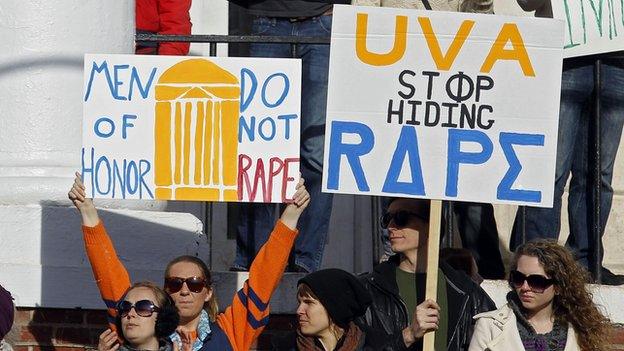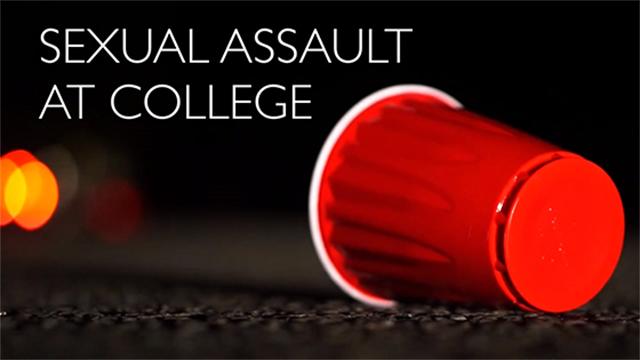Rolling Stone apologises for Virginia rape story
- Published
.jpg)
Rolling Stone magazine is now backing away from a central part of its blockbuster story, external about sexual assault on the campus of the University of Virginia.
The article begins with a shocking, graphic account of a woman named Jackie who says she was gang raped as part of a hazing ritual at a storied university fraternity, Phi Kappa Psi. It then traces Jackie's struggle with the incident and what author Sabrina Rubin Erdely portrays as the school's ham-fisted sexual assault bureaucracy.
Publication of the piece led to demonstrations on Virginia's campus, widespread criticism of the schools administration, and the decision by university president Teresa Sullivan to suspend all fraternity and sorority activities until mid-January. Phi Kappa Psi members received death threats, and its house was vandalised.
On Friday the magazine said that its trust in Jackie "was misplaced" and apologised to "anyone who was affected by the story".
"In the months Erdely spent reporting the story, Jackie neither said nor did anything that made Erdely, or Rolling Stone's editors and fact-checkers, question Jackie's credibility," Rolling Stone managing editor Will Dana writes. He says that "new information", however, has exposed "discrepancies in Jackie's account".
"We were trying to be sensitive to the unfair shame and humiliation many women feel after a sexual assault and now regret the decision to not contact the alleged assaulters to get their account," he writes.
The apology comes hours after the Washington Post published an extensive investigation into the story, which included multiple interviews with Jackie.
Among reporter T Rees Shapiro's findings were that there is no record of the fraternity having a party on the night Jackie says she was raped and there is no individual at the fraternity who matches the description of the man she says led her attack.
.jpg)
The University of Virginia responds to the Rolling Stone article by suspending all fraternity and sorority activities until mid-January
When Jackie told the paper the name of her alleged attacker, it was similar to that of a Virginia graduate who belonged to a different fraternity and who worked at the aquatic centre where Jackie said they first met. The Post contacted the man, and he denied ever having met her.
Even Jackie's friends, Shapiro writes, have begun to question her version of the events and said that her story had changed over time.
Friday's events are the crescendo of what has been a growing chorus of questions about the reporting and fact-checking in the Rolling Stone article.
On 24 November, author and magazine editor Richard Bradley said the facts, external presented in the story were difficult to believe and that Erdley broke a "cardinal rule" of journalism in not trying to contact the alleged attackers.
"If Rubin Erdley knew their names and didn't call them, that is horrible journalism and undermines confidence in her reporting," he wrote.
Reason, external and the New Republic, external cited Bradley's blog in stories of their own, Slate published a podcast interview, external with Erdley that raised more questions than it answered, and soon doubts were being echoed throughout mainstream media.
Then the Washington Post broke the dam.
Jackie told the Post that she had asked Erdely to remove her from the article but that the writer had refused. Jackie then agreed to participate, but only if she were allowed to fact-check her own portions of the story - to which Erdely agreed.
According to the Post, Jackie said she "felt manipulated" by Erdely, and that she "felt completely out of control over my own story". She stands by her account, but she now says some of the details in the magazine may not be accurate.
In the Rolling Stone article Erdley portrays the school as being "less concerned with protecting students than it is with protecting its own reputation from scandal".
Now, however, it is Erdely's reputation, along with that of her magazine, that is in doubt.
Vox's Sarah Kliff says, external it was "dangerous and arguably unethical" for the magazine to move forward with publishing the story after Jackie asked that her name be withdrawn.
While it is "impossible to say" what happened to Jackie, Reason's Robbie Soave writes, external, the Rolling Stone article is clearly false.
"Not slightly false, or partly false, but false," he says. "And if Rolling Stone had done its job, the magazine might well have determined that before such a journalistic catastrophe unfolded."
Jonah Goldberg of the National Review says, external he's sure that Phi Kappa Psi will sue Rolling Stone, and the results will be "fun to watch".
"Rolling Stone accused the members of that fraternity of being members of an evil, ongoing, criminal enterprise," he writes.
The New Yorker's Philip Gourevitch adds, external that the magazine's apology is unacceptable, as well.
"Shorter Rolling Stone note: We misreported Jackie's story. We published it without checking it. We blame her for telling it to us," he tweets.
The larger question, however, is what the collapse of the piece means for efforts to address sexual assault on campus.
Although Jackie's story was only a part of the Rolling Stone piece - and many other victims came forward in the story and afterward with their own experiences with sexual assault - it was the narrative hook on which the whole article rested.
"The doubt cast on Jackie's story has been feeding the myth that we have been combating for 40 years that women lie about rape, and I feel that will put women at a disadvantage in coming forward," Emily Renda, a rape counsellor at Virginia and one of Jackie's friends, told the Post.
"This feels like a betrayal of good advocacy if this is not true," she said. "We teach people to believe the victims."
She cites statistics that show that only 2-8% of rape reports are "fabricated or unfounded".
"This is bad in ways that have far-reaching social consequences. We've just begun, as a society, to not immediately and harshly question a woman who says she was raped," writes, external Jezebel's Anna Merlan. "We've just begun to talk about campus sexual assault - which is, to be clear, still a very real problem at UVa and across the country.
As doubts about the story grew midweek, the Washington Examiner's Asche Schow worried that if the allegations were proven false, "rape victims and advocates trying to fix the system will be set back years perhaps even decades".
Caitlan Flannigan, who wrote a much-publicised piece about fraternity culture for the Atlantic - told Slate that fraternity members were starting to change their views about the seriousness of the rape problem on campus.
"But if this turns out to be a hoax, it is going to turn the clock back on their thinking 30 years," she said.
As key portions of Rolling Stone's reporting crumble, these worst-case scenarios appear increasingly realistic.
- Published25 November 2014

- Published21 March 2014
.jpg)
- Published1 October 2014
